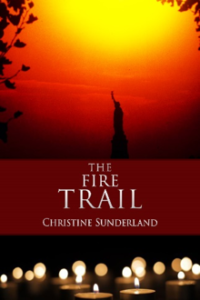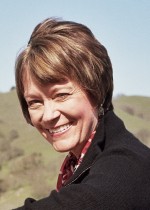by Christine Sunderland
 Today is Independence Day, our annual celebration of the Declaration of Independence, unanimously signed by the Second Continental Congress on July 4, 1776. The second paragraph rings in our memory:
Today is Independence Day, our annual celebration of the Declaration of Independence, unanimously signed by the Second Continental Congress on July 4, 1776. The second paragraph rings in our memory:
“We hold these truths to be self-evident, that all men are created equal, that they are endowed by their Creator with certain unalienable Rights, that among these are Life, Liberty and the pursuit of Happiness.”
Thirteen colonies proclaimed that they were sovereign states, united, no longer subject to colonial rule by Great Britain.
It is a true story we grew up with, a story we celebrate, a story we pass on to our children. We live in this story as a part of our history as Americans, despite many attempts to erase it. Nowhere in the world does such a story exist, does such freedom exist, does such a daring and imaginative people exist. It is the story of our birth, the story of our founding a foundation that we would build upon. It is this story that led to other emancipation stories – slavery, suffrage, immigration. It is a story of a melting pot of race, nation, and class.
And so God has endowed us with unalienable rights: life, liberty, and the pursuit of happiness. But can these rights be protected without belief in God? This is the question many ask. The best answer, of course, lies in conversion, belief in God’s authority. And this is where American Christian fiction writers come in.
As Christian tellers of tales, we build upon a foundation of moral authority. With the decline in belief in the Judeo-Christian God, and his authority and protection, we are called to write stories reflecting these unalienable rights endowed by our Creator. We remind America who she was, is, and is meant to be, that shining city on a hill. We remind by telling stories that reflect the right to life, liberty and the pursuit of happiness, and the freedoms protected by the Constitution.
In this way Christian fiction is iconic – the narratives act as windows opening to God the Creator and allowing the Holy Spirit to enter through those windows to blow across our land. Icons – the images of Christ and his saints, are prayed into and through. They focus one’s prayer. Just so, our stories focus upon words, scenes, characters, and events.
These paths map the art of living. Some see Tolkien in this light; some see Lewis; some see Dostoevsky. Fairy tales use symbols and metaphors that reflect the Christian universe. Poetry and hymnody imbue our lives with epiphanies, sudden sight and understanding.
Many say we should not preach. But we can still be subtle. We can create characters formed by Christian attributes that undergo Christian suffering.
As a people loses faith in the Judeo-Christian God, it loses its moral authority, increasing the need for morality plays, moral stories. As rights endowed by man replace rights endowed by the Creator, fiction has a mandate to inform and form character. Atheism and agnosticism are barren, fostering depression and suicide among our young, and encouraging self-mutilation and gender dysphoria.
In my “novels of ideas,” I seek to write stories that are icons, infusing beauty and truth and goodness into character and plot and scene. Heroes are heroic. Families are honored. Children are held close to the heart. Life – from conception to the grave – is treasured, a gift from our Creator. This is not to say my characters do not suffer, for to be sure, it is in the heart of their suffering that they reveal beauty, truth, goodness, and love. And it is through suffering that they know their need to change, to be reborn.
In my novel-in-progress, The Music of the Mountain, set in 2023, the tyranny, fear, and disorder of pandemics and lockdowns is met with the ordered belief in Christ’s love  through his Church. Silencing, censoring, and banning meet heroic virtues that save the past through the written word in histories, that save seekers through the Word of God, that save the lonely through words of baptism and rebirth. These words themselves are icons opening upon the holy, dancing with melodies, singing with angels and saints and the Heavenly Host.
through his Church. Silencing, censoring, and banning meet heroic virtues that save the past through the written word in histories, that save seekers through the Word of God, that save the lonely through words of baptism and rebirth. These words themselves are icons opening upon the holy, dancing with melodies, singing with angels and saints and the Heavenly Host.
In Angel Mountain (Wipf and Stock, 2020), set in 2018, a hermit preaches to a crowd, baptizing in the waters of a pool, risking his life. He prays through icons in his cave, but to be sure, he himself is an icon, a way to Christian reality.
In The Fire Trail (eLectio 2016), set in 2014, a murderer is on the loose, and it is this tension between civil disorder and civilization that is worked out through stories within the story, words remembered, music heard and played from the heart. Amidst the chaotic dissonance of the modern world, order is sought in artistic form and beauty, in freedom through law. Prayers in a chapel lead to epiphanies in the soul.
The absence of morality tales in our culture (the portrayal of Christian faith and practice, with apologetics), has left a void filled by atheism/agnosticism/secular materialism. To be sure, we must entertain readers with page-turners, but let us show a believer who tells a nonbeliever why he or she believes in Christ, and how science has bolstered her belief with proof. Let us show meaning and clear purpose. Let us give readers a guidebook to Heaven and tempt them with true joy, beauty, and goodness.
We are told to show, not tell. Let us tell through showing and show through telling. Let us create Heaven on Earth with all its truth, goodness, beauty, and love. Let us invite Christ Jesus into our pages once again.
Independence Day, the Fourth of July, reminds us to renew our faith in America by renewing our reader’s faith as well. Let us declare independence from our culture of death, so that we may found a culture of life, liberty, and the pursuit of happiness, endowed by our Creator, in every story we write, page by page. Let us create men and women who give life to our barren world, who reach for meaning and purpose, and who find the answer to what – and whom – they long for.
 Christine Sunderland has authored seven award-winning novels: Pilgrimage, set in Italy, Offerings, set in France, Inheritance, set in England, Hana-lani, set in Hawaii, The Magdalene Mystery, set in Rome and Provence (all Oaktara), The Fire Trail (eLectio), set at UC Berkeley, and Angel Mountain (Wipf and Stock), set on Mount Diablo, east of Berkeley. She serves as Managing Editor for the American Church Union (www.AmericanChurchUnion.com). Visit Christine at www.ChristineSunderland.com (website and blog), Facebook, and LinkedIn.
Christine Sunderland has authored seven award-winning novels: Pilgrimage, set in Italy, Offerings, set in France, Inheritance, set in England, Hana-lani, set in Hawaii, The Magdalene Mystery, set in Rome and Provence (all Oaktara), The Fire Trail (eLectio), set at UC Berkeley, and Angel Mountain (Wipf and Stock), set on Mount Diablo, east of Berkeley. She serves as Managing Editor for the American Church Union (www.AmericanChurchUnion.com). Visit Christine at www.ChristineSunderland.com (website and blog), Facebook, and LinkedIn.
